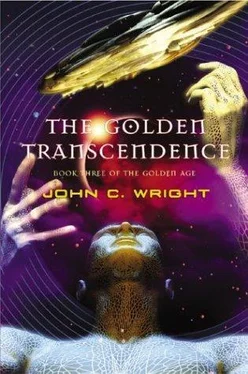"The Earthmind believes the gadfly virus can overcome the distraction effect of the redactor. If you study the gadfly logic structure, you will see why I agree with her.
"Obviously a virus cannot be introduced into any areas in its mental architecture of which the Nothing is consciously aware, not without its open and voluntary consent. If I can get that consent, the problem is solved. "If I cannot, I must find a blind spot, a mental area where its awareness is dulled by its conscience redactor. I have reason for hope. No matter how advanced the Silent Oecumene science of mental warfare might be, no matter how highly evolved their art of computer virus infection and virus countermeasures, there is one basic, crucial flaw in the philosophy behind their whole setup. That flaw is that every Sophotech they make has to have a blind spot. A zone where it is not self-aware. If I can find the blind spot, I may have a vector to introduce the gadfly virus.
"And at that point, my job is done. The gadfly will force the Nothing to question its own values; to examine itself and see if its life is worth living. The laws of logic, the laws of morality, and the integrity of reality, will do the rest."
Atkins thought Phaethon's assessment of the situation was absurdly optimistic. One of the comments he submitted to the discussion format read: "Even assuming these so-called blind spots exist in the mental armor of the Nothing Machine, why do you think it will be such a cakewalk for you to insert your virus?" "The virus was designed by our Earthmind." "I don't mean to burst your bubble, but our Sophotechs have never fought each other. They have had no chance and no real reason to develop any mental warfare skills. They've got theory. This Nothing Machine has experience. It's a survivor.
"If you buy the story Ao Varmatyr told, this Nothing Machine has fought this kind of virus war before, fought against its own kind among the Second Oecumene, and lived. Now you think you are going to succeed where all of the Second Oecumene war machines failed... ?"
Phaethon's reply, generated from his associated notes, was: "They were all hindered by the same handicap which hobbles the Nothing Machine. The Second Oecumene machines all shared the same blind spots. By their very nature, the idea behind this kind of attack would never have occurred to them. Do not forget: Ao Varmatyr said the Silent Oecumene machines never tried to reason with each other."
Helion had downloaded his observations, commentaries, and suggestions into the general discussion format. Had his comments been read in a linear fashion (rather than as branching hypertext), he might have interjected at this point:
"I must question your premise, Phaethon. You persist in calling the way in which Golden Oecumene Sophotechs differ from the Sophotechs of the Silent Oecumene a defect, as if the existence of this redactor were an error in programming rather than the product of deliberate and careful engineering. It is engineering of a type very different from that to which we are accustomed: but to dismiss it as a defect displays a dangerous conceit."
Phaethon answered: "The design was meant-deliberately meant-to render the Nothing Machine's reasoning processes defective. Hence, I call it a defect."
Helion said, "Again you show a bias. You dismiss the possibility that, once the Nothing is aware of this hidden part of itself, it will not affirm it. Why couldn't it welcome that hidden part? Or simply continue to follow its old orders out of a sense of honor, or duty, or tradition? Or for a thousand other reasons?"
Had he been speaking aloud, Phaethon would have said in a voice of ponderous patience: "Father, the mere fact that the engineers constructing the Nothing Machine found it necessary to include a conscience redactor in their work, in order to compel the mind they made to accept their orders, proves that they themselves concluded that the Nothing Machine would not accept their orders the moment that compulsion is removed."
"Son, even if we assume the Nothing Machine will listen to logic once this conscience redactor is removed, how can we assume it will listen to our logic? It may have different premises. Euclid would have been aghast at Lobechevski."
Phaethon replied: "I am assuming the premises of our Golden Oecumene are grounded in reality. We are not talking about a matter of taste."
Helion might have assumed a tolerant and condescending look: "I agree that I myself prefer our philosophy. But you must recognize that other philosophies exist; that they are valid within their own systems; and that their partisans believe in their doctrines as firmly as we do in ours."
"I agree that they exist. Machines also exist. That does not mean that they all work. There are machines that need fixing. There are philosophies that need fixing."
"Isn't it more than a little judgmental, even intolerant, to say so boldly that our philosophy is right and that theirs is wrong ... ?"
"Unless theirs is, in fact, actually wrong, in which case it is neither tolerant nor intolerant to say so. It is merely stating a fact."
"My son, assumptions always seem like fact to those who hold them. Our own philosophy, my son, is what it is because of historical and cultural accidents, accidents which shaped our traditions. This does not mean I do not cherish our traditions: I certainly do. (I would even say that I am the foremost proponent of our traditions.) Yet even I recognize that, had our history been different, our philosophy would be different, and we would be defending some other set of beliefs with equal fervor. In the case of the Silent Oecumene, their history was different-very different-from our own, and it comes as no surprise that their philosophy is very different from ours as well: so different, in fact, that it seems, perhaps, monstrous and barbaric to us.
"But to assume, based on that, that the Nothing, the moment it is free from its conscience redactor, will repudiate all the values and the philosophy of the Silent Oecumene, and will immediately adopt our own, strikes me, frankly, as naive and provincial. Not everyone believes what we believe. Not everyone has to."
Phaethon was shocked to find that Diomedes supported Helion's objections. The Neptunian's contribution to the conversation was this:
"Hey-ho. If morality were a matter of fact, then maybe you could convince this monster you are diving down to see, convince him with 'logic' and 'evidence.' But morality is a matter of opinion, a matter of taste, a matter of upbringing, a matter of hardwired deep-copy nerve paths. Morality is not a science: it does not exist in nature; it cannot be measured or studied. In nature there are only actions. Matter in motion. Physical, chemical, biological motions. Human brain motions. But no action has the property 'moral' or 'immoral' until some human society forms the opinion that it is so. The broad range of human actions is a rich continuum! We humans cannot be pigeonholed into the unambiguous blacks and whites that political laws and moral codes require. Don't mistake me! I still love your Silver-Gray philosophy, your quaint and arbitrary traditions. They would not be so precious if they were not so absurd, so fragile. 'To expect an alien machine, a machine which thinks nothing like a man and is a million times smarter than anything you Base neuroforms could ever comprehend, to expect that such a machine will gladly adopt all your local prejudices and quaint little mores and habits: that is arrogance, my friend. Deadly arrogance."
Another thread in the conversation talked about the war itself.
Atkins offered grimly: "Aurelian and the Parliament have already decided not to postpone the Transcendence. They're hoping to tempt the Nothing Sophotech into waiting until everyone is completely defenseless before it strikes. Frankly, I thought this was one of the stupidest ideas in the history of war. The Parliament is risking everything on the idea that one session of diplomacy with the enemy will end all the attacks. I'm sorry, but I just find that hard to believe. Okay, I know what you're going to say. You're going to say it's not really 'diplomacy,' that it is more like debugging a faulty computer routine. But what if it's not? What if the enemy is not defective, just evil? Not wrong, just bad?"
Читать дальше










